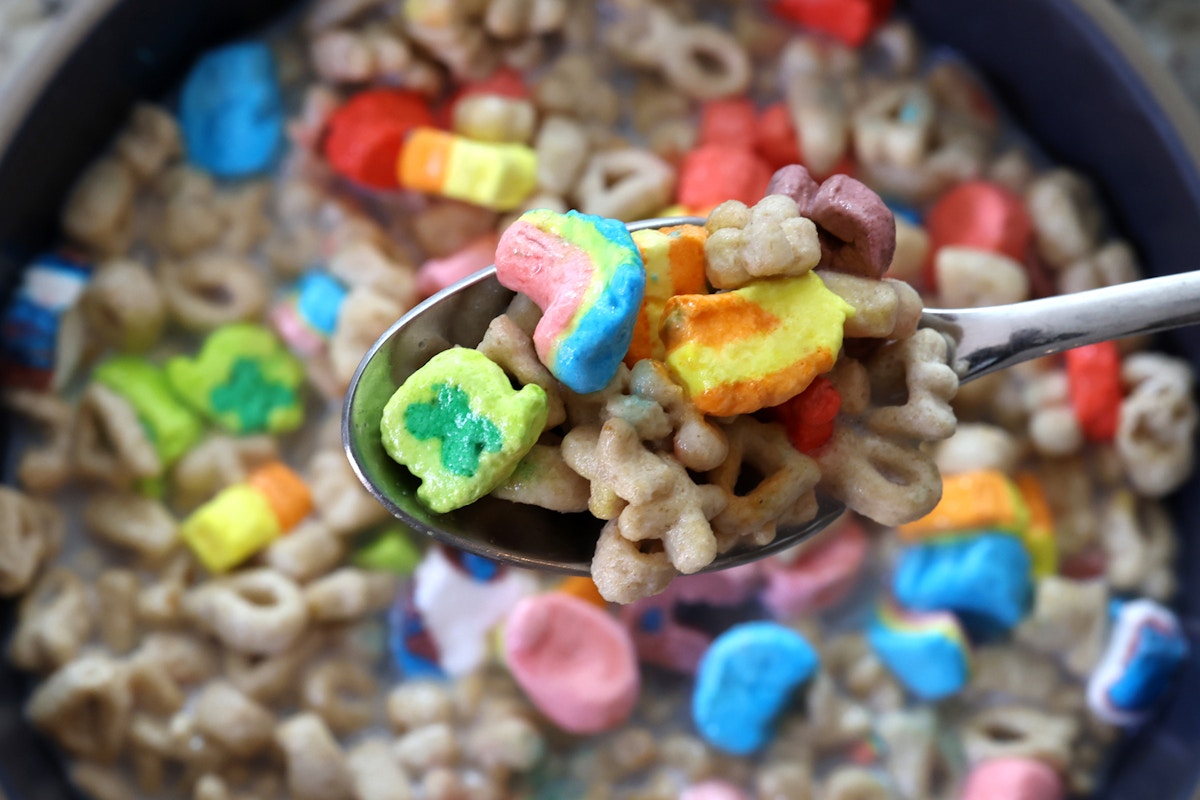The makers of Fruity Pebbles, Froot Loops, Blessed Charms, and other preferred cereal makes are bitterly lobbying in opposition to a new Meals and Drug Administration proposal that would avoid them from labeling their merchandise as “healthy.”
The proposed Food and drug administration rule mandates that foodstuff labeled as healthful must have a important food items team — such as dairy, fruits, or full grains — and ought to match selected boundaries on saturated fats, sodium, and added sugars.
The rule boundaries cereals, for example, to no much more than 2.5 grams of sugar for each serving in get to be labeled as healthful — a restriction foodstuff producers claim would exclude about 95 percent of ready-to-try to eat cereals on the sector.
In response, processed foodstuff organizations that develop a assortment of treats, baked merchandise, pastas, and frozen pizzas are difficult the rules just before they are finalized by the agency. Among the the most vocal food companies are producers of higher-sugar cereals, which are largely marketed to youngsters and have been criticized as a driver of the being overweight epidemic in The usa.
In a joint filing made last thirty day period, the greatest cereal producers in the country — General Mills, Kellogg’s, and Publish Purchaser Brands — decried the proposed nutritional requirements and threatened to file a lawsuit, demanding the tips as a violation of corporate totally free speech legal rights.
The rule, “if finalized in its existing variety,” the organizations wrote, “would be open to authorized obstacle in that it violates the Initially Modification by prohibiting truthful, non-deceptive promises in an unjustified method and also exceeds FDA’s statutory authority in quite a few approaches.”
The thought of a legal challenge might not be an idle threat.
The community remark docket features a submitting from the Washington Lawful Basis, a shadowy nonprofit that litigates esoteric and often controversial business passions. The group submitted a letter in opposition in the kind of a lawful brief, laying out a wide circumstance for a upcoming court obstacle towards the Food and drug administration recommendations.
The firm contended that the healthy labeling demands are an unconstitutional overreach of authorities ability. Food items organizations, the Washington Legal Basis argued, have “constitutionally shielded industrial speech” rights covering their capacity to use the phrase “healthy” to explain their included sugar products and solutions.
The Fda, the Washington Authorized Foundation wrote in its brief, “cannot explain why buyers cannot make their individual healthier conclusions based mostly on [nutrition labeling] details. Fairly, it seeks to limit the food items companies’ speech.”
The group does not disclose its donors and did not answer to a ask for for comment. In previous decades, the Corn Refiners Affiliation, a lobby team that signifies the substantial fructose corn syrup business, has disclosed financial ties to the Washington Lawful Foundation.
Drug businesses, together with Purdue Pharma, the makers of OxyContin, have also utilized the Washington Authorized Basis to obstacle authorities procedures and establish legal precedent to reduce the skill for prosecutors to find legal costs for drug company executives.
Conagra, Ocean Spray, the American Frozen Foods Institute, and the American Bakers Affiliation likewise hinted at a legal risk to the Fda healthful food stuff labeling rule. All four organizations cited constitutional problems with the proposed labeling requirements in letters to the company.
The joint filing from cereal makers not only scorns the labeling rules, but also argues that sugary cereals pose no wellness dangers and are, in actuality, helpful to modern society and childhood well being.
The corporations said that they view the “extremely strict” pointers as “alarming” for the reason that “cereal is one particular of the most inexpensive, nutrient dense breakfast possibilities a person — grownup or boy or girl — can make … with a wide vary of choices to match unique cultures, tastes, and style.” Cereals, the organizations claimed, are now identified for “nutritional benefits,” specified their inclusion in a assortment of federal packages that “serve the nation’s vulnerable populations,” such as the Special Supplemental Diet System for Ladies, Infants, and Children and the National University Lunch Application.
The corporations billed that cereal “delivers on diet when eaten alone, but when consumed as component of breakfast, it elevates the nutrition even more,” with cereal eaters exhibiting an “overall greater eating plan quality.” As evidence, the submitting cites a 2019 review executed by in-property scientists used by Common Mills, the maker of Fortunate Charms, Cinnamon Toast Crunch, and Trix, among other manufacturers.
Lucky Charms and Trix include about 12 grams of sugar for every serving, approximately 5 occasions the limit proposed by the FDA’s balanced labeling recommendations. What is much more, researchers have located that small children usually take in far more than 2 times the proposed serving dimensions of cereal for breakfast, that means that a common sugary breakfast cereal portion is made up of 24 grams of sugar, near to the sugar content material of a Snickers chocolate bar.
The foods brands also pressured that the Fda need to take into consideration that cereals characterize an economical and obtainable possibility for “families who are experiencing foodstuff insecurity.” As evidence, the companies reference one more Typical Mills-funded research to display that very low-earnings cereal buyers had better every day calcium ingestion and throughout all profits ranges, cereal eaters were affiliated with better diet program good quality.
The agency, they wrote, should realize the useful function of sugar. “Sugar performs a part in meals over and above palatability it controls water activity, results in texture, provides bulk, and also contributes to taste complexity,” the submitting states.
Common Mills, Kellogg’s, and the Purchaser Brand names Association, a trade group for cereal manufacturers, in the same way submitted a protest against the Food and drug administration proposal, citing its effects on sugary cereal manufacturers. Cereal makers produced half a dozen independent filings, counting many trade groups and specific protest letters from makers.
Unbiased scientists, nonetheless, have found that eating plans large in processed foodstuff and sugar are linked to weight problems, diabetes, high risks of stroke, obesity-similar cancers, hypertension, and dental illnesses.
Children’s eating behaviors of large-sugar cereals and snacks, several experiments have revealed, are the driving element for superior amounts of childhood obesity. Small children are also bombarded with advertising for ultrasweet cereals, a dynamic that has been found to raise the subsequent ingestion of advertised cereals.
The FDA’s shift to discourage sugary diets to youngsters and curtail marketing of this kind of food items to children echoes the Obama administration, when a wide range of voluntary suggestions have been proposed in 2011.
At the time, lobbyists for the food stuff sector mobilized a broad counterassault in Congress, with allied lawmakers inserting provisions into the authorizing legislation to hold off the voluntary guidelines. In the course of this battle, the food stuff industries hired SKDK, a consulting agency co-founded by Anita Dunn, who went on to enable regulate President Joe Biden’s modern campaign and at the moment serves as his close adviser in the White Home.
The new proposed rules also broaden the types of foodstuff that might be labeled as healthier, such as nuts, bigger-excess fat fish these types of as salmon, avocados, and water.
The open remark period for the Fda rules closed on February 16. The company, which has provided providers a few years to comply with the rule once it is finalized, is nevertheless reviewing the feed-back.






More Stories
Hanco’s: Bringing the Flavors of Vietnam to Brooklyn
TropiBowls Bring Healthy Food to Tamarac • Tamarac Talk
How can we make our brains prefer healthy food? – study